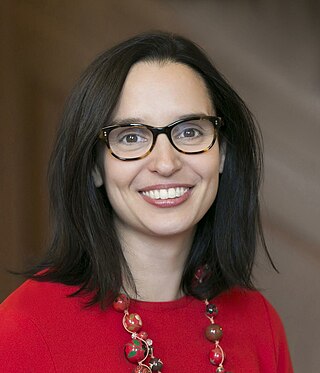Related Research Articles
Complexity characterises the behaviour of a system or model whose components interact in multiple ways and follow local rules, leading to non-linearity, randomness, collective dynamics, hierarchy, and emergence.
Management is the administration of organizations, whether they are a business, a nonprofit organization, or a government body through business administration, nonprofit management, or the political science sub-field of public administration respectively. It is the science of managing the resources of businesses, governments, and other organizations.

Social science is one of the branches of science, devoted to the study of societies and the relationships among individuals within those societies. The term was formerly used to refer to the field of sociology, the original "science of society", established in the 19th century. In addition to sociology, it now encompasses a wide array of academic disciplines, including anthropology, archaeology, economics, human geography, linguistics, management science, communication science and political science.
In multiple countries' curriculums, social studies is the integrated study of multiple fields of social science and the humanities, including history, culture, geography and political science. The term was first coined by American educators around the turn of the twentieth century as a catch-all for these subjects, as well as others which did not fit into the helps the models of lower education in the United States, such as philosophy and psychology. One of the purposes of social studies, particularly at the level of higher education, is to integrate several disciplines, with their unique methodologies and special focuses of concentration, into a coherent field of subject areas that communicate with each other by sharing different academic "tools" and perspectives for deeper analysis of social problems and issues. Social studies aims to train students for informed, responsible participation in a diverse democratic society. The content of social studies provides the necessary background knowledge in order to develop values and reasoned opinions, and the objective of the field is civic competence.
In the field of management, strategic management involves the formulation and implementation of the major goals and initiatives taken by an organization's managers on behalf of stakeholders, based on consideration of resources and an assessment of the internal and external environments in which the organization operates. Strategic management provides overall direction to an enterprise and involves specifying the organization's objectives, developing policies and plans to achieve those objectives, and then allocating resources to implement the plans. Academics and practicing managers have developed numerous models and frameworks to assist in strategic decision-making in the context of complex environments and competitive dynamics. Strategic management is not static in nature; the models can include a feedback loop to monitor execution and to inform the next round of planning.

An academic discipline or field of study is a branch of knowledge, taught and researched as part of higher education. A scholar's discipline is commonly defined by the university faculties and learned societies to which they belong and the academic journals in which they publish research.
Managerial economics is a branch of economics involving the application of economic methods in the organizational decision-making process. Economics is the study of the production, distribution, and consumption of goods and services. Managerial economics involves the use of economic theories and principles to make decisions regarding the allocation of scarce resources. It guides managers in making decisions relating to the company's customers, competitors, suppliers, and internal operations.

HEC Paris is a business school and one of the most prestigious and selective grandes écoles in France and the world, located in Jouy-en-Josas outside of Paris. HEC offers MiMs, MScs in International Finance, MBA and EMBA programs, specialised MScs, PhDs and executive education.
New institutionalism is an approach to the study of institutions that focuses on the constraining and enabling effects of formal and informal rules on the behavior of individuals and groups. New institutionalism traditionally encompasses three major strands: sociological institutionalism, rational choice institutionalism, and historical institutionalism. New institutionalism originated in work by sociologist John Meyer published in 1977.
Governance is the process of making and enforcing decisions within an organization or society. It is the process of interactions through the laws, social norms, power or language as structured in communication of an organized society over a social system. It is done by the government of a state, by a market, or by a network. It is the process of choosing the right course among the actors involved in a collective problem that leads to the creation, reinforcement, or reproduction of acceptable conduct and social order". In lay terms, it could be described as the political processes that exist in and between formal institutions.
Organizational ecology is a theoretical and empirical approach in the social sciences that is considered a sub-field of organizational studies. Organizational ecology utilizes insights from biology, economics, and sociology, and employs statistical analysis to try to understand the conditions under which organizations emerge, grow, and die.
In sociology and organizational studies, institutional theory is a theory on the deeper and more resilient aspects of social structure. It considers the processes by which structures, including schemes, rules, norms, and routines, become established as authoritative guidelines for social behavior. Different components of institutional theory explain how these elements are created, diffused, adopted, and adapted over space and time; and how they fall into decline and disuse.

The sociology of culture, and the related cultural sociology, concerns the systematic analysis of culture, usually understood as the ensemble of symbolic codes used by a member of a society, as it is manifested in the society. For Georg Simmel, culture referred to "the cultivation of individuals through the agency of external forms which have been objectified in the course of history". Culture in the sociological field is analyzed as the ways of thinking and describing, acting, and the material objects that together shape a group of people's way of life.
Public administration theory is a mixture of history, organizational theory, social theory, political theory, and other related subject focusing on the meaning, structure, and function of public service under all circumstances. form. It often describes the main historical underpinnings of bureaucracy research as well as epistemological issues related to public service as a profession and an education field.
Human science studies the philosophical, biological, social, and cultural aspects of human life. Human science aims to expand our understanding of the human world through a broad interdisciplinary approach. It encompasses a wide range of fields - including history, philosophy, sociology, psychology, justice studies, evolutionary biology, biochemistry, neurosciences, folkloristics, and anthropology. It is the study and interpretation of the experiences, activities, constructs, and artifacts associated with human beings. The study of the human sciences attempts to expand and enlighten the human being's knowledge of its existence, its interrelationship with other species and systems, and the development of artifacts to perpetuate the human expression and thought. It is the study of human phenomena. The study of the human experience is historical and current in nature. It requires the evaluation and interpretation of the historic human experience and the analysis of current human activity to gain an understanding of human phenomena and to project the outlines of human evolution. Human science is the objective, informed critique of human existence and how it relates to reality.
Institutional logic is a core concept in sociological theory and organizational studies, with growing interest in marketing theory. It focuses on how broader belief systems shape the cognition and behavior of actors.
Trust management deals with how people or groups determine who or what to trust.
The social sciences are the sciences concerned with societies, human behaviour, and social relationships.
Behavioral strategy refers to the application of insights from psychology and behavioral economics to the research and practice of strategic management. In one definition of the field, "Behavioral strategy merges cognitive and social psychology with strategic management theory and practice. Behavioral strategy aims to bring realistic assumptions about human cognition, emotions, and social behavior to the strategic management of organizations and, thereby, to enrich strategy theory, empirical research, and real-world practice".

Julie Battilana is a scholar, educator, and advisor in the areas of social innovation and social change at Harvard University. She is the Joseph C. Wilson Professor of Business Administration at Harvard Business School and the Alan L. Gleitsman Professor of Social Innovation at the Harvard Kennedy School.
References
- ↑ "Strategy and Business Policy". HEC Paris. Retrieved 2021-03-29.
- ↑ "Organizations, Strategy and Society: The Orgology of Disorganized Worlds". Routledge & CRC Press. Retrieved 2021-03-29.
- ↑ The Institutional Logics Perspective: A New Approach to Culture, Structure and Process. Oxford, New York: Oxford University Press. 2012-04-30. ISBN 978-0-19-960193-6.
- ↑ "Organizational Evolution and Strategic Management". SAGE Publications Ltd. 2021-03-28. Retrieved 2021-03-29.
- ↑ "Time to Reorganize! Understand Organizations, Act, and Build a Meaningful World". Coursera. Retrieved 2021-03-29.
- ↑ "Organizations, Strategy and Society: The Orgology of Disorganized Worlds". Routledge & CRC Press. Retrieved 2021-03-29.